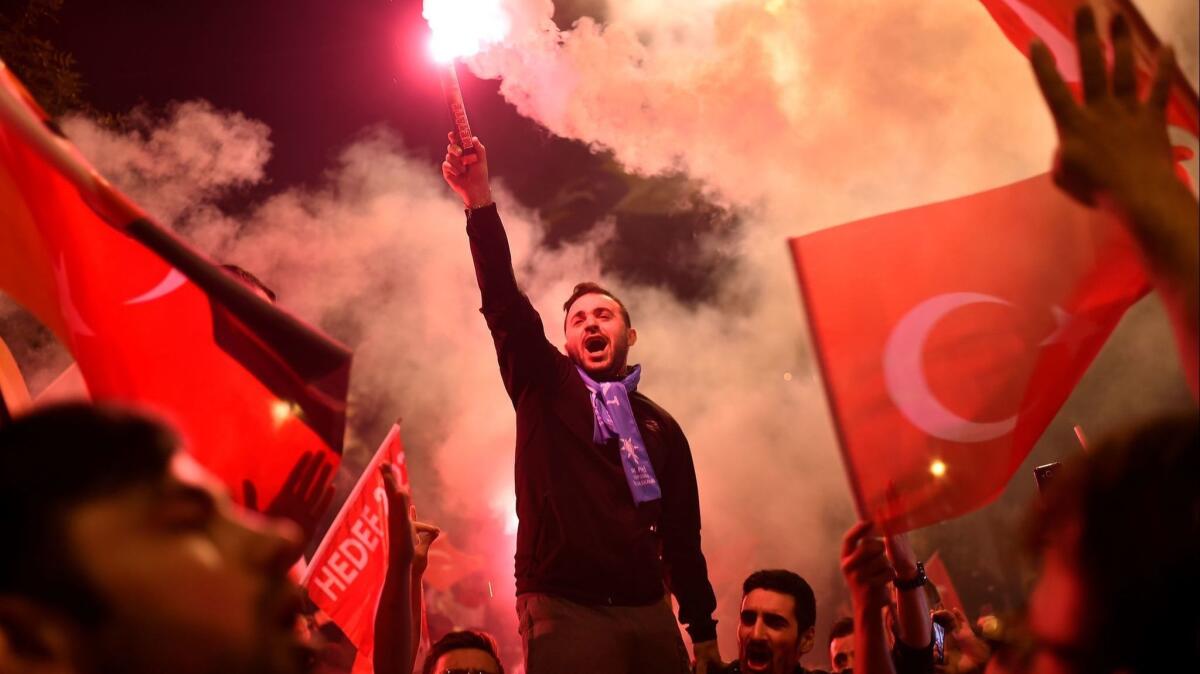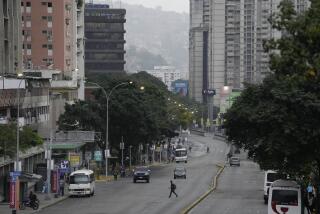Erdogan wins reelection as Turkey’s president, claims expanded powers

Reporting from ISTANBUL, TURKEY — Appearing before supporters in Istanbul, Turkish President Recep Tayyip Erdogan said unofficial results showed that he had won the presidential election in Turkey and that his party had taken a majority in Parliament.
“We are determined to continue strengthening our democracy and the rights and freedoms of our people,” Erdogan told supporters.
The leading opposition party, the leftist Republican People’s Party, later conceded the election, which was marred by violence and accusations of voter fraud.
More than 90% of eligible voters turned out Sunday to cast a vote for one of six presidential candidates and one of eight choices for a party to represent them in the 600-seat Parliament, according to the state-run news agency Anadolu, the only outlet legally allowed to report results. With more than 59 million votes counted, the agency reported that Erdogan won 52.68% of the vote and that his Justice and Development Party received 53.69% of the vote, a comfortable majority in Parliament.
Erdogan’s closest rival was the Republican People’s Party’s Muharrem Ince, who won 22.4% of the votes, according to final but unofficial results. The pro-Kurdish Peoples’ Democratic Party passed a 10% vote threshold, securing a seat in Parliament.
Official results will take several days to be tallied as the Supreme Electoral Council, which oversees elections in the country, reviews the ballots.
Earlier in the day, Ince told supporters to return to the polling stations where they had cast ballots to make sure no electoral fraud occurs during counting.
Opposition parties implemented their own vote-counting system, called the Fair Election Platform, asking legally mandated observers from each party to take pictures of the total counts on each ballot box at the end of the day and send them to a central database to be collated. With 54% of the ballot boxes counted, the group conceded that Erdogan had won.
By late Sunday night, thousands of opposition supporters had taken to the streets in the capital, Ankara, and Istanbul to protest the election results.
Erdogan cited the high turnout in his victory speech and said, “I hope no one will try to cast a shadow on Turkey’s electoral system and results to hide their own failures.”
Erdogan led Turkey as prime minister from 2003 to 2014, when he became the country’s first directly elected president. Under Erdogan, Turkey became the 17th-largest economy in the world and decades-old restrictions on religious expression, including a ban on the headscarf, were lifted, giving birth to a pious, educated middle class that has returned the favor with its votes.
But in July 2016, a section of Turkey’s military tried to take over the country, a failed coup that left nearly 250 people dead. The country has been in a state of emergency since then and tens of thousands have been arrested, charged with everything from participating in the attempted coup to insulting the president.
In April, Turkish voters approved constitutional amendments to expand the president’s powers.
Erdogan will now be able to run for at least two more five-year terms and has the right to appoint Cabinet ministers, vice presidents and many of the country’s top judges. Erdogan will also be able to legislate issues that do not infringe on fundamental rights of individuals, in much the same manner as Parliament can. Parliament could overturn those decrees as well as exercise a handful of other checks to counter Erdogan, but that is unlikely if his own party controls the legislative body.
“We are ready to implement the new structure of government as soon as possible,” Erdogan said Sunday night.
Turkey faces a number of pressing problems, which Erdogan has argued require a more streamlined government. The Turkish lira has lost a fifth of its value against the U.S. dollar this year, and inflation now stands at 12%. More than 3.5 million Syrian refugees reside in Turkey, and Ankara has thousands of troops in Syria fighting Islamic State as well as Kurdish groups that it has declared terror organizations.
The election itself was marred by violence. In the eastern province of Erzurum, Mehmet Siddik Durmaz, a local leader with the opposition Iyi Party, was fatally shot when an argument between his supporters and members of another opposition party turned violent.
Hundreds of thousands of observers, representing each party, were deployed across Turkey to monitor the voting. Videos of violence at the polls trickled in on social media throughout Sunday, including one showing police firing into the air to disperse crowds at a polling station in the southeastern city of Suruc.
Farooq is a special correspondent.
More to Read
Sign up for Essential California
The most important California stories and recommendations in your inbox every morning.
You may occasionally receive promotional content from the Los Angeles Times.










